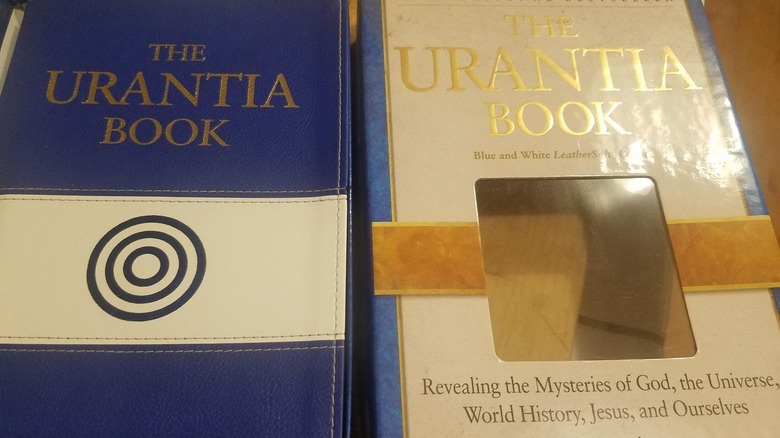The Religious Origins Of The Famous Celestial Sleepytime Tea
We may receive a commission on purchases made from links.
That sweet sleeping bear in a comfy green armchair, a crackling fire, a purring cat, a plate of yummy baked goods, and of course, a pot of tea, create the perfectly cozy setting that is printed on every box of Celestial Seasonings Sleepytime Tea, a favorite store-bought tea brand. What appears idyllic and frankly, innocuous, has some pretty disturbing origins. The history of the iconic box of herbal tea that seems to be on everyone's pantry shelf actually has a history that involves fringe religion, aliens, and eugenics.
The start of this tea is pretty wholesome, or at least that is how it appears on the surface. In the late 1960's and early 1970's, Morris Siegel, known as Mo, along with a group of friends, were spending some time in Boulder, Colorado. In true hippy fashion, they were exploring the beautiful nature there and came across fields of wild herbs. Siegel was inspired to make herbal tea blends, and after producing 500 pounds of "Mo's 36 Herb Tea" packaged in hand-sewn muslin bags, the rag tag group were able to secure a loan to start Celestial Seasonings. Along with Siegel, the founding members of the company were brothers Wyck and John Hay, Peggy Clute, and Lucinda Ziesing. The name of Celestial Seasonings came from Ziesing's "flowername," but also seems to hint at the connection founding members had to "The Urantia Book," a compilation of teachings conveyed by a celestial being (read: alien) through a human being.
What does The Urantia Book say?
People that believe in aliens can still make a delicious blend of chamomile, spearmint, lemongrass, tilia flowers, blackberry leaves, hawthorne, and rosebuds, but it turns out that the alien thing is the least upsetting part of Celestial Seasonings' history. "The Urantia Book" describes "God's plan for the progressive evolution of individuals, human society, and the universe." It turns out that this version of "God's plan" has a lot to do with purifying the human race.
The book was likely authored by Dr. William Sadler, a psychiatrist and author of books like, "Long Heads and Round Heads; or, What's the Matter With Germany." Yikes. In the article originally published in Van Winkle's, Megan Giller writes about how "The Urantia Book" is full of racist ideas, with text sometimes lifted verbatim from these published works on eugenics. "The Urantia Book" describes how there are millions of planets with one of them being Urantia (Earth). There is a hierarchy of six races, and an Aryan Adam and Eve come to each planet to guide a process where "the inferior and unfit are largely eliminated." Adam and Eve were unsuccessful in their mission on Urantia, so "The Urantia Book" details how this responsibility is passed on to citizens of Earth to "work out your planetary problem of race improvement by other and largely human methods of adaptation and control." The book is available to download for free from the Urantia Foundation, and truly, it gets so much worse.
How did the Urantia Book impact Celestial Seasonings?
For Mo Siegel, the book provided moral guidance and gave a framework on how to run the company. In the book, "You've GOT to Read This Book! 55 People Tell the Story of the Book That Changed Their Life," Siegel writes that he "was searching for truth and the book was loaded with it." Double yikes. Caroline MacDougall, one of the first employees, told Van Winkle's that the founders would regularly cite "The Urantia Book" to support their points during meetings. The quotations that can be found on tea boxes and tags are also inspired by the teachings of "The Urantia Book." It seems unlikely that "The Urantia Book" plays any part in how Celestial Seasonings is run today, but it undoubtedly played a significant role for the founders.
Celestial Seasonings put herbal teas on the map and energized the health food movement in the United States. What started as a humble and scrappy business was sold to Kraft in 1984 for $40 million dollars. In the year 2000, Celestial Seasonings was acquired by Hain Food Group, now the Hain Celestial Group, in a $382 million dollar deal. Siegel retired from the company in 2002.
Siegel has served on the boards of various food companies including Whole Foods, Annie's, and Chocolove. Siegel was even appointed by the governor of Colorado and confirmed by the state senate to serve on the board of Great Outdoors Colorado. Siegel remains the president of The Urantia Foundation.


